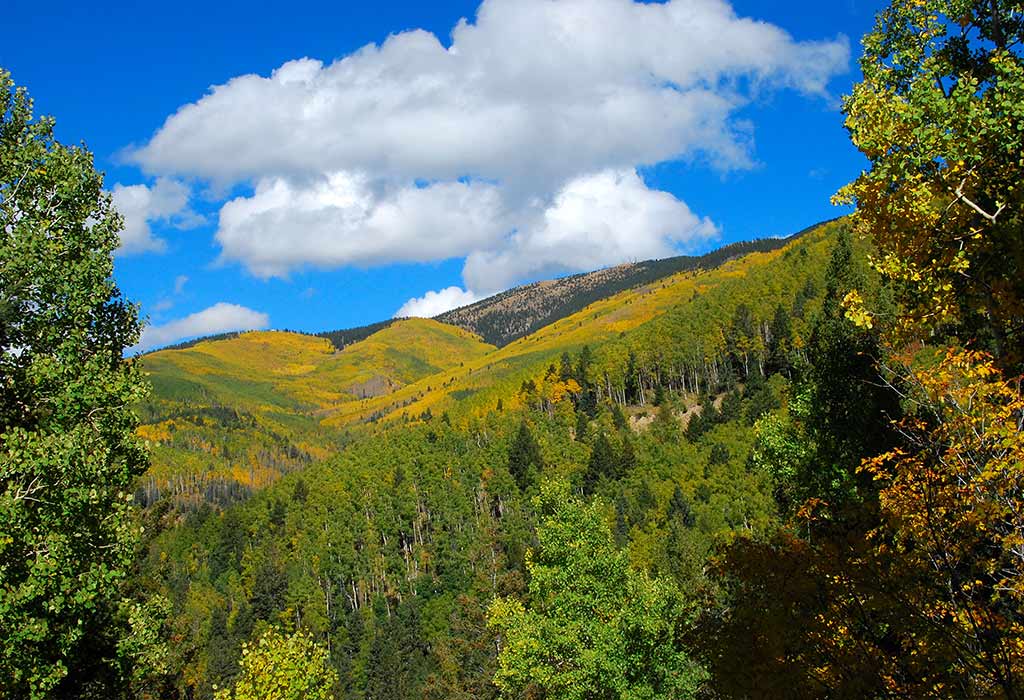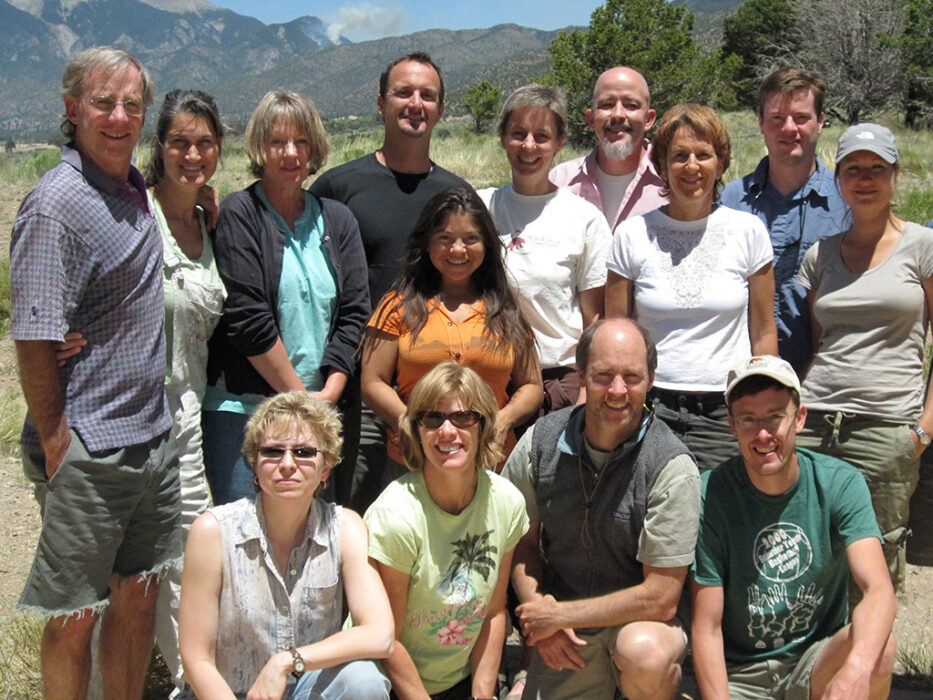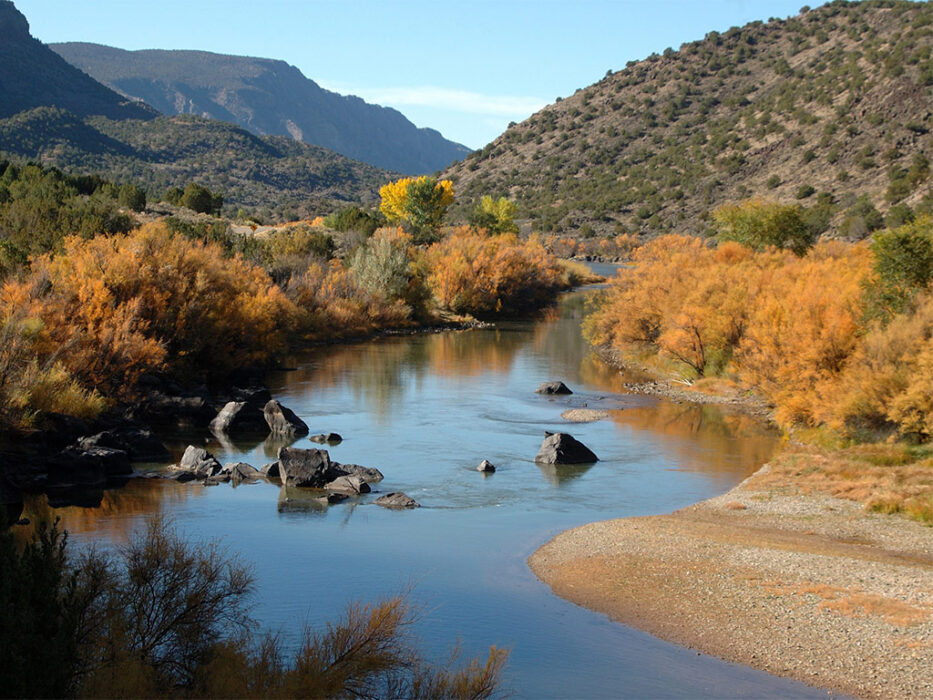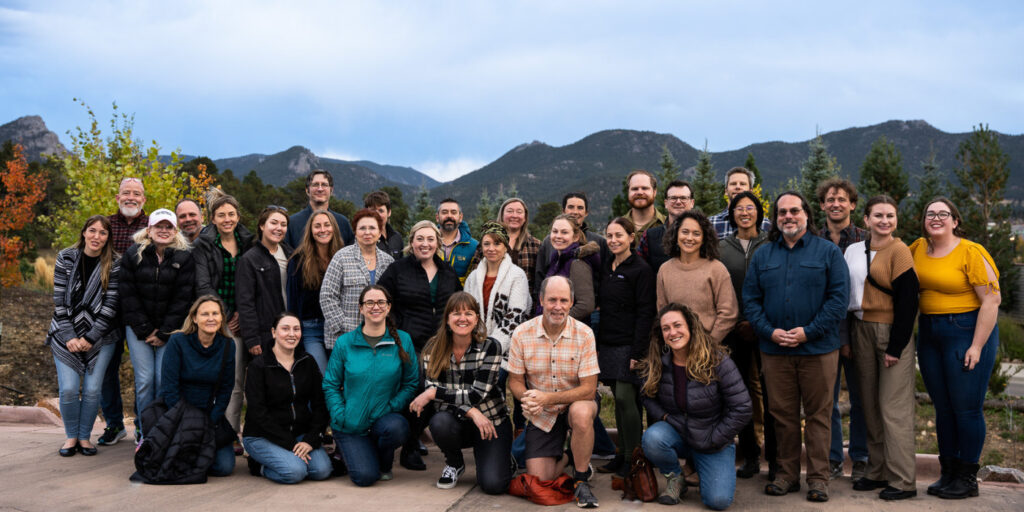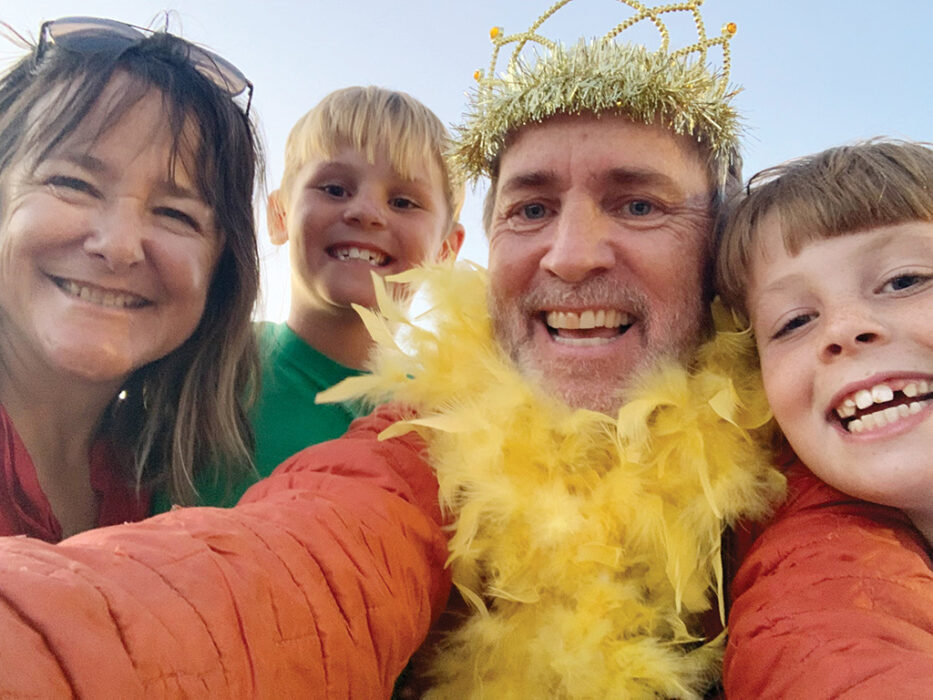Back when WildEarth Guardians was still called Forest Guardians, I had an experience that would shape me for many years to come.
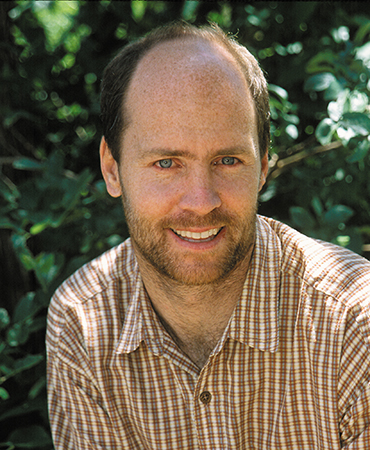
John Horning, 2004. Credit: WildEarth Guardians
I was at a meeting in Espanola, New Mexico, hosted by the Bureau of Land Management. The purpose of the meeting was to address the poor condition of streams in northern New Mexico, caused by cows. By this point, I had attended dozens of public meetings and spoken at some. It was a part of the job I enjoyed.
But this meeting was different from the others. From the moment Sam Hitt (Guardians founder) and I walked into the room, I felt intense hostility. I sensed palpable anger in the gaze of dozens of people, most of them wearing cowboy hats. These “locals” saw me as the enemy– a self-righteous outsider who came to tell them how to live their lives.
For the first time in my work as a Guardian, I worried for my personal safety. For the first time, I realized that our work was not intrinsically safe– that, in many ways, we were engaged in a street fight. Most meaningful change is disruptive, and most people don’t like their lives being disrupted. People will fight back. They will come together in gangs to fight real change. Fortunately, I had a gang as well and it had a wonderful leader: Sam Hitt.

Sam Hitt. Credit: Sam Hitt
“The best lack all conviction, while the worst Are full of passionate intensity.”
– W.B. Yeats, The Second Coming
Yeats was wrong. Sam was one of the best and he was full of passionate intensity. His commitment to the cause provided an example I was eager to emulate. To borrow an overused phrase, “I would march on the gates of Hell with him.”
That wouldn’t be necessary because Hell came to us. It was around this time that a bomb was planted in our mailbox.
It was hard, if not impossible, not to take this threat personally. After all, Guardians only had three or four employees then. While a bomb is undeniably terrible, it did provide two good things– clarity of purpose and solidarity. Things were less complicated then. There were no office politics, no internecine struggles. We were looking outward at our mission– to protect and restore the Wild. All the fights were outside our office walls, and the only purity test was a commitment to that mission. Of course, there were disagreements, but they were quickly resolved because we never doubted the good faith of the other person.
“This is a challenge; it is hard for all of us not to judge, because we tend to have a comfort zone… and see anything outside of this comfort zone as “totally wrong” or even “threatening.” …While we all do a little judging here and there, mostly innocently and unconsciously, some do this routinely and in a way that creates feelings of anger, frustration, guilt and even rebelliousness against whomever does not fit this comfort zone… Still others feel superior because they think that their comfort zone, the little box, is better than other people’s comfort zones.”
– Michelle Roya Rad, psychologist
People join gangs for identity, security, companionship, and a sense of belonging. I never thought about it until recently, but that is what I found at Guardians. Like most of you, my conscious motivation for joining WildEarth Guardians was the work– laboring on behalf of the environment, defending the animals and streams that move through it, the air above it, and the resources within it.
As I’ve grown older (and, hopefully, wiser) I see ways in which my work served more personal, more selfish goals. I felt a sense of belonging and companionship with like-minded people who shared the same values. And there was 30 years of security, of having a place to call home that was as much a home as my own.
And identity. What can be a more rewarding identity than knowing you’re one of the “good guys,” striving every day to protect the vulnerable from the powerful, to give voice to those who don’t have a voice? Guardians and my “comfort zone” were nearly identical. There were often dogs in the office because we are all animal lovers, there were always great conversations with very bright people who know more than me, and lots of vegetarians.
When I became executive director, I naturally wanted to provide and protect the “comfort zones” of my colleagues. Equally important, I wanted to be what Sam Hitt was for me– an example of passionate commitment to our mission. As we grew from a handful of people to an organization ten times that size, the task of reconciling those two goals became more difficult. Internal forces diminished focusing outward at the mission and demanded more time looking at struggles between allies who forgot we were all working toward the same goal.
“The fundamental problem… is “the presence in every progressive organization of a small but very vocal fringe that views every problem as a sin.” This hyper-moralization of internal disputes spills over into real-world but otherwise routine disagreements, he continued: “It has become too easy for people to conflate disagreements about issues with matters of identity.”
– The New York Times, June 29, 2022
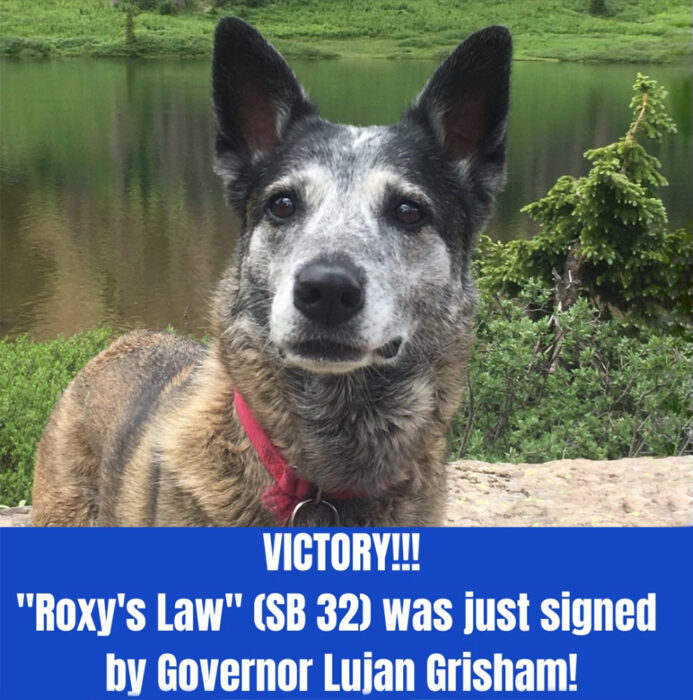
“Roxy’s Law,” which bans the use of traps, snares, and poisons on public lands, was signed into law on April 5, 2021.
I have always felt all our issues are somehow connected. The oppression of women, the marginalization of minorities, economic disparity, the abuse of animals– share some organizing principle that unites them all. For me, that organizing principle is defending the vulnerable from the powerful. I believe we have done a worthy job in that regard. Our advocacy, lawsuits and other endeavors have had a profound effect on the vulnerable– forests, wildlife, streams and many more entities without a voice that benefit from our hard work.
Still, we have a long way to go. Years ago, I wrote about purity tests and how our purity tests separate us from unlikely allies. Purity tests rarely serve a cause bigger than the satisfaction of the person who demands those tests– namely, reinforcing that person’s identity as a “good person.” I believe the measure of a good person is how effectively they defend the vulnerable, which I define as the animals and places that are assaulted daily. I cited polls that demonstrate most Americans agree with our policies but reject our methods.
For example, in 1991, 78% of Americans described themselves as environmentalists, today that number is 41%. The answer to the question, “what happened” is complex. However, we do know this…
“…poll after poll shows that about 70 percent favor public policies that control air, water and toxic waste pollution. What has happened is that the image of environmentalism and environmental advocacy itself has become entwined in the political polarization that has infected all aspects of American political life… Instead of seeking common ground from a shared love of nature… environmentalists took the sanctimonious high ground of moral superiority.
– The Hill June 27, 2023
The hyper-moralization within an organization spills out to the real world. We cannot talk down to each other and we most certainly cannot talk down to those unlikely allies we desperately need to accomplish our mission. There simply are not enough people in “our gang” to change our nation’s course of ignoring vital environmental issues.
“While liberals might like to think of themselves as more open-minded, (recent studies show) they are no more tolerant of people unlike them than their conservative counterparts are… We like people similar to us. There’s a long line of research showing that we prefer members of our own group…”
– From the Society of Personality and Social Psychology, Politico May 9, 2017
A crisis is a time when difficult decisions must be made. And sacrifice. Not just sacrifices regarding consumption, travel, and waste, but things that cut closer to the bone. Like our “comfort zones.”
I confess, when I see a red MAGA hat, my instinct is to avoid, dismiss and distance. I have lots of little red flags that trigger me about other people. But, if we really want to be good, instead of just feeling good– we must do everything we can. That includes reaching out to people who make us uncomfortable and truly engage them, not with an eye to winning an argument or educating them, but with genuine curiosity.
Little acts like this are how we win the long game, with an eye to decades instead of days. People listen to their friends– and the more friends each of you have, the more friends the wolf, the lesser prairie chicken, and countless other animals have. I believe we can move that 41% number back to 78% (and beyond) by showing the world open hearts, full of kindness rather than critique.
“…no one ever convinced anybody by logic; and even logicians use logic only as a source of income.”
– Arthur Schopenhauer
Decades ago, standing in that meeting in Espanola, I felt my hostility rise to meet those of the others. I saw them as the enemy– narrow-minded exploiters of the wild. They judged me and I judged them right back. I mentally armed myself with the facts and figures that would irrefutably prove my arguments.
Then, something sublime happened. I felt love. Love of the land and streams for which I wanted to be a voice. Love for the world that allowed me to be their defender, their Guardian. And yes, love for the people who saw me as their enemy. Rather than deluge those people with science, I recited the names of the creeks whose sinuous, gentle banks I had come to know and love. Chihuahuenos…Canones…Polvadera.
“The beginning of wisdom is to call things by their proper name.”
– Confucious
I knew then that this was my passion. Advocating for streams, the arteries of life that nourish our thirsty land. As they listened, they could see how strongly I cared for something that was not merely a “data point” to me, but a place I loved as much as they did. In this way, they could see me as one of them, not an intellectual tourist motivated by a superior self-righteousness.
“Nobody cares how much you know until they know how much you care.”
– Theodore Roosevelt
This is the idea I want to leave with you– the medium is the message. The message I aim to send is this, “Join us in our cause; help protect the vulnerable.” The medium is you.
When you build walls instead of bridges, you serve the message, and our cause, poorly. It’s easy to find imperfections in other people, but only one goal is served that way– feeling better about ourselves. I confess I’ve sometimes lost sight of the real goal and took the shortcut to feeling good about myself by judging others. But the long road is where the greatest rewards await us.
I am thinking now about setting goals fifty years into the future. I still believe we’re in a street fight– and that the more effective we become, the more resistance we will face. But I believe the best way to reach our goals is by leading with love, directed both outside our walls and within them. If we cannot find common ground with our colleagues, we will never find it with others.
Perhaps the chief characteristic of our times is how polarized we are. For many, it’s a natural response to lean into this feeling of opposition. By creating our own lines in the sand, we gain some small measure of control in a world that often seems out of control. I believe our collective struggle and our inner struggle are the same– to choose curiosity over judgment, to choose love over anger, and most of all, to choose courage over fear.
We can look to nature to find models for this– especially from wolves. They are courageous, absolutely focused on their goals, and they work together.
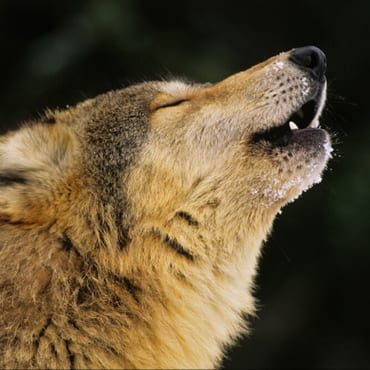
Not long ago, I spent four days in the Gila with a family– a boy, a girl, and their parents. Despite our reassurances, the children were frightened by wolves. When I howled into the darkness and wolves began howling back, the kids were visibly afraid. However, by our last night – when we could hear howls coming from every direction – the fear of the children was tempered by something else… curiosity. Curiosity gave way to love, and love gave way to courage. The young girl said to her father, “the wolves are talking to each other… they’re talking to us as well.”
When I hear them howl, I like to imagine they were saying to me what I say to you now… “courage.”
